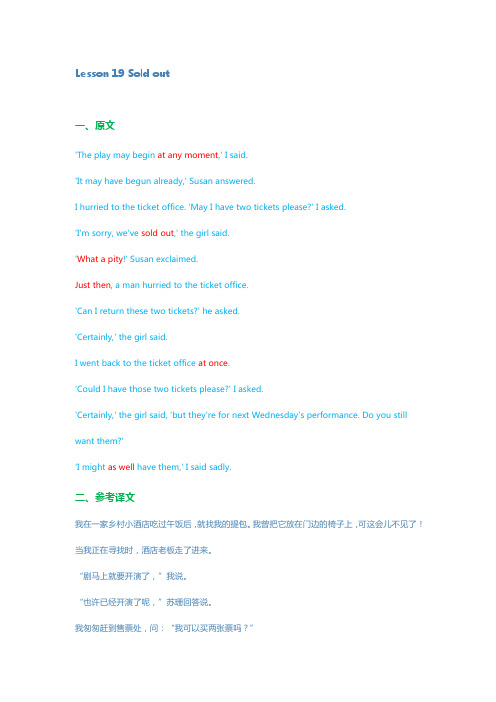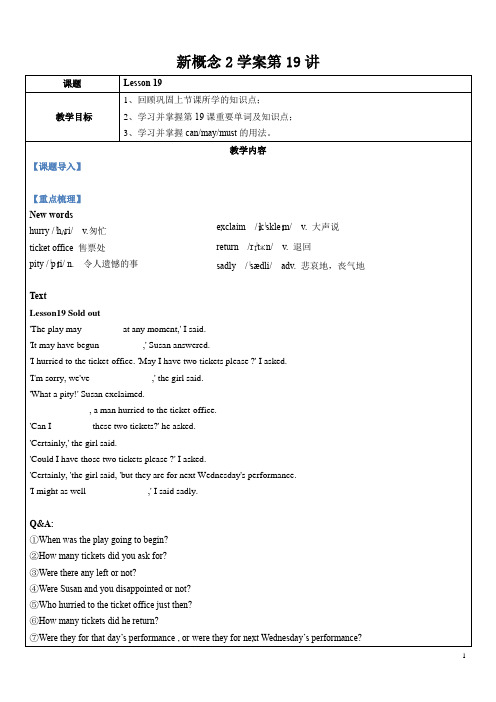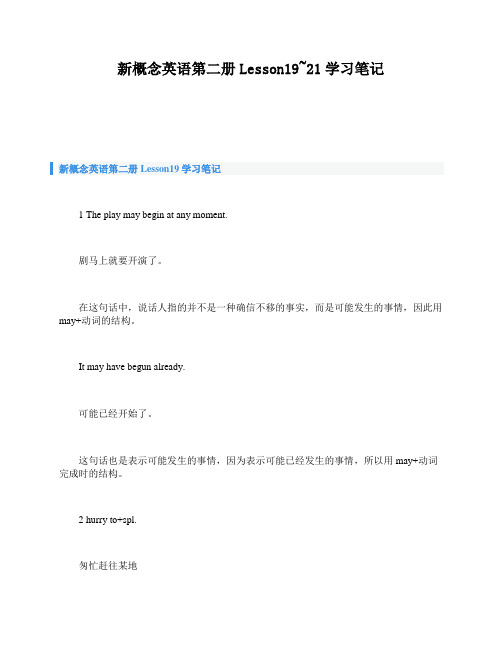新概念英语第2册Lesson19~21语法知识点
新概念英语(第二册)精读笔记-Lesson 19 Sold out

Lesson 19 Sold out一、原文'The play may begin at any moment,' I said.'It may have begun already,' Susan answered.I hurried to the ticket office. 'May I have two tickets please?' I asked.'I'm sorry, we've sold out,' the girl said.'What a pity!' Susan exclaimed.Just then, a man hurried to the ticket office.'Can I return these two tickets?' he asked.'Certainly,' the girl said.I went back to the ticket office at once.'Could I have those two tickets please?' I asked.'Certainly,' the girl said, 'but they're for next Wednesday's performance. Do you still want them?''I might as well have them,' I said sadly.二、参考译文我在一家乡村小酒店吃过午饭后,就找我的提包。
我曾把它放在门边的椅子上,可这会儿不见了!当我正在寻找时,酒店老板走了进来。
“剧马上就要开演了,”我说。
“也许已经开演了呢,”苏珊回答说。
我匆匆赶到售票处,问:“我可以买两张票吗?”“对不起,票已售完。
新概念英语第二册:第21课课文详解及语法解析

新概念英语第二册:第21课课文详解及语法解析-CAL-FENGHAI.-(YICAI)-Company One1新概念英语第二册:第21课课文详解及语法解析课文详注 Further notes on the text1.I live near an airport and passing planes can be heard night and day. 我住在一个机场附近,过往飞机日夜不绝于耳。
(1)passing 是现在分词,作形容词用,表示“经过的”、“过往的”:He stopped a passing car.他挡住了一辆过往汽车。
He forgot the man with passing time.随着时间的消逝,他忘掉了那个人。
(2)night and day是固定短语,意为“日日夜夜”、“夜以继日”:He thought of the matter night and day.他日夜在想这个问题。
He worked night and day.他夜以继日地工作。
2.The airport was built years ago, but for some reason it could not be used then. 机场是很多年前建的,但因为某种原因当时未能启用。
(1)years 前面不加确定的数词时,一般表示“很多年”,weeks等的用法与它相似:He left the city years ago.他多年前就离开了这座城市。
I have not seen him for weeks.我已经有好几个星期没见他了。
(2)some 在这里不表示“一些”,而表示“某个”、“某种”等:I'll tell you someday.有一天我会告诉你的。
We'll talk about it some other time.我们改日再谈这件事。
3.…it came into use. ……机场开始使用了。
新概念英语第二册第19课知识讲解

新概念英语第二册第19课精品文档Lesson 19 sold out 票已售完After I had had lunch at a village pub, I looked for mybag. I had left it on a chair beside the door and now itwasn't there! As I was looking for it, the landlord camein.'Did you have a good meal?" he asked.'Yes, thank you,' I answered, 'but I can't pay the bill. Ihaven't got my bag.'The landlord smiled and immediately went out. In afew minutes he returned with my bag and gave it back tome.'I'm very sorry,' he said. 'My dog had taken in into thegarden. He often does this!'New words and expressions 生词和短语pub [pʌb] n. 小酒店landlord [ˈlændlɔrd] n. 店主bill [bɪl] n. 帐单参考译文:我在一家乡村小酒店吃过午饭后,就找我的提包。
我曾把它放在门边的椅子上,可这会儿不见了!当我正在寻找时,酒店老板走了进来。
“您吃得好吗?”他问。
“很好,谢谢。
”我回答,“但我付不了帐,我的提包没有了。
”酒店老板笑了笑,马上走了出去。
一会儿工夫他拿着我的提包回来了,把它还给了我。
“实在抱歉,”他说,“我的狗把它弄到花园里去了,他常干这种事!”Text1.After I had had lunch at a village pub, I looked for my bag.2. I had left it on a chair beside the door and now it wasn't there!3.As I was looking for it, the landlord came in.4.'Did you have a good meal?" he asked.5.'Yes, thank you,' I answered, 'but I can't pay the bill. I haven't got my bag.'6.The landlord smiled and immediately went out.7. In a few minutes he returned with my bag and gave it back to me.8.'I'm very sorry,' he said. 'My dog had taken in into the garden. He often does this!'参考译文1.我在一家乡村小酒店吃过午饭后,就找我的提包。
新概念2-Lesson19讲义

新概念2学案第19讲⑧Did you buy them or not?一、重要知识点1. Sold outsell v.v. 过去时___________过去分词________________标题中的sold out 前被省略了____________________。
例题精讲The cake ________well. Today’s cakes ______________ at 11:00 a.m.A.is sold; were sold outB.sells; were sold outC. is sold ; sold outD.sells;sold out总结:当表示“销售好、卖的好”时,表达方式为_____________________, _______(有/无) 被动语态;当表示“卖光”时,表达方式为_____________________, _______(有/无) 被动语态;助记n. _____________ 销售,销售量✧This computers are in the factory now and three days later they will be for sale.✧Almost everything is on sale on the Internet on 11th November.总结:__________________________________________________________2.'The play may begin at any moment,' I said.关于moment的短语①You can come to me ___________________________, because we are best friends.②______________________, he was listening to the radio. That was why he didn’t hear the knock on the door.【等你来挑战】一、将课文补充完整。
新概念英语第二册Lesson19_21学习笔记

新概念英语第二册Lesson19~21学习笔记新概念英语第二册Lesson19学习笔记1 The play may begin at any moment.剧马上就要开演了。
在这句话中,说话人指的并不是一种确信不移的事实,而是可能发生的事情,因此用may+动词的结构。
It may have begun already.可能已经开始了。
这句话也是表示可能发生的事情,因为表示可能已经发生的事情,所以用may+动词完成时的结构。
2 hurry to+spl.匆忙赶往某地例句:We hurried to the airport.我们匆忙赶往机场。
3 What a pity!真遗憾!这是What+a/an/the+名词的感叹句形式。
以what开头的感叹句还有以下几种。
①What+名词例句:What fun!真开心!②What+(a/an)+形容词+名词例句:What a said story!真是个凄凉的故事啊!③What+ a/an+形容词+名词(+主语)+谓语例句:What a delicious dinner you made!你做了真丰盛的晚餐啊!④What+名词+主语+谓语例句:What happy girls they are.那些女生好幸福啊!4 exclaim [动词] 惊叫,呼喊相当于scream,cry out,指因疼痛、惊奇、愤怒等突然喊叫。
例句:She screamed when seeing the devastating car accident.当她目击这场惨烈的车祸时忍不住惊叫起来。
词语扩展:exclamation n. 呼喊,惊叫,叹词,感叹语exclamation mark 感叹号,叹号5 Could I ...please?在这句里,could代替了can,这是比较委婉地提出请求的用法。
在时间上和can没有区别。
6 might as well...还是……好,不妨与may as well意思相同,只不过前者更委婉。
新概念第二册语法知识点汇总(完美版)

新概念第二册语法知识点汇总(完美版)新概念第二册一般现在时1. 用法:①表示经常性的动作或习惯性的动作,常与表示频率的时间状语连用例:Mrs. Sawyer stays at home every day.②表示主语具备的性格、能力、特征例:He is a careless boy他是一个粗心的男孩。
③表示一种状态例:There is a picture of his dog on the wall.墙上挂着一张他狗狗的照片。
④表示客观事实和普遍真理例: The earth moves around the sun.地球围着太阳转。
2. 标志词:频率副词( always; usually; often; sometimes; rarely; neve)r every …每个…;once ??—次;twice ??两次; …times几次in the morning / afternoon / evening; at noon / night; on Sundays3. 构成:①当句中动词为Be动词时:肯定句:主语+ Be动词(am / is / are) +其它否定句:主语+ Be not (am not / isn ' t / ar》r+其它一般疑问句:Be动词(am / is / are) +主语+其它②当句中动词为情态动词时:肯定句:主语+ 情态动词+ 其它否定句:主语+ 情态动词+ not + 其它一般疑问句:情态动词+ 主语+ 其它③当句中动词为实义动词时:肯定句:主语+ 实义动词+ 其它否定句:主语+ don t / does n实义动词原形+其它一般疑问句:Do / Does + 主语+ 实义动词原形+ 其它一般现在时,当主语为第三人称单数时,实义动词变其三单形式。
do和does为一般现在时的助动词,在否定句及疑问句中辅助实义动词使用,当句中有助动词do和does时,实义动词变原形(吸星大法/照妖镜)。
新概念英语第2册Lesson19~21课文详注
新概念英语第2册Lesson19~21课文详注新概念英语第2册Lesson19课文详注1.The play may begin at any moment. 剧马上就要开演了。
The guests may arrive at any moment.客人们马上就要来了。
It may/might rain(at) any moment.这天气随时都可能下雨。
2.I’m sorry, we’ve sold out. 对不起,票已售完。
(1)这句话中用了缩略形式 I’m(=I am) 和we’ve(=we have)。
缩略形式一般用于口语和非正式文体中。
在正式文体中要避免使用。
(2)sell out为固定短语,可指“(店主)售完(某种货物)”、“(货)被售完”:They have sold out of eggs.他们的鸡蛋卖完了。
Tickets for tonight’s performance are sold out.今晚演出的门票已售完。
3.What a pity! 真可惜!这是一个常用的表示可惜、遗憾的感叹句。
我们还可以说:What a pity(it is) you can’t see their performance!你不能观看他们的演出真是遗憾!4.I went back to the ticket office at once. 我马上又回到售票处。
at once 为固定短语,在这里可译为“马上”、“立刻”:When he heard the news, he went home at once.听到这消息,他立刻就回家了。
Please come at once.请立刻就来。
5.Could I have those two tickets please?我可以买那两张票吗?(1)could 虽然是can的过去式,但在这里并不表示过去,而是指现在。
用could提出请求或建议比can要委婉。
新概念英语第二册-目录-语法总结
Unit 01
Lesson 1 A private conversation私人谈话
Lesson 2 Breakfast or lunch?早餐还是午餐?
Lesson 3 Please send me a card请给我寄一张明信片
Lesson 4 An exciting trip激动人心的旅行
Lesson91 Three men in a basket三人同篮
Lesson92 Asking for trouble自找麻烦
Lesson93 A noble gift崇高的礼物
Lesson94 Future champions未来的冠军
Lesson95 A fantasy纯属虚构
Lesson96 The dead return亡灵返乡
定冠词the的用法;some与any的区别
过去进行时与一般过去时;use to的用法
比较结构表示法;Little和few的用法
用于表示目的和方向的介词和副词
被动语态用法补充
Will和be going to
一般将来完成时;将来完成进行时
过去完成时与从属连词when,before,after,until
Lesson58 A blessing in disguise?是因祸得福吗?
Lesson59 In or out?进来还是出去?
Lesson60 The future卜算未来
Lesson61 Trouble with the Hubble哈勃望远镜的困境
Lesson62 After the fire大火之后
Lesson21 Mad or not?是不是疯了?
Lesson22 A glass envelope玻璃信封
新概念第二册课文翻译及学习笔记【Lesson19、20、21】
新概念第二册课文翻译及学习笔记【Lesson19、20、21】【课文】First listen and then answer the question.听录音,然后回答以下问题。
When will the writer see the play?'The play may begin at any moment,' I said.'It may have begun already,' Susan answered.I hurried to the ticket office. 'May I have two tickets please?' I asked.'I'm sorry, we've sold out,' the girl said.'What a pity!' Susan exclaimed.Just then, a man hurried to the ticket office.'Can I return these two tickets?' he asked.'Certainly,' the girl said.I went back to the ticket office at once.'Could I have those two tickets please?' I asked.'Certainly,' the girl said, 'but they're for next Wednesday's performance. Do you still want them?''I might as well have them,' I said sadly.【课文翻译】“剧马上就要开演了,”我说。
新概念第二册Lesson 19知识要点总结
新概念第二册Lesson 19复习要点一.L19词汇讲解:1.hurry 匆忙hurry to...匆忙去某地/ in a hurry 匆忙/hurried----hurriedlyHe went to the library in a hurry.He hurried to the library.He went to the library hurriedly.2.pity 令人遗憾的事What a pity!好遗憾啊!It’s a pity you didn’t come to the party.你没有来参加派对,真遗憾。
pitiful可怜的,令人同情的3.exclaim大声说“This is amazing!”she exclaimed. 这太棒了,她大声说。
4.return 退回He returned to Taizhou yesterday.他昨天回到了泰州。
I’ll return your money soon.我很快就会还你的钱。
a return ticket 往返车票I want to return this pair of shoes.我想退掉这双鞋。
5.sadly 伤心地sorrow 悲伤/ sorrowful悲伤的,伤心的二.重点短语:1.have got/has got 有/得了某种疾病,当have 或者has 的意思是“有,得病”的使用,可以互换2.give up 放弃,投降give in 投降/上交give away 送人区分give in 和give up 的不同:The soldiers lost the battle but they didn’t give themselves up . 士兵们输掉了战斗,但是他们没有投降。
The soldiers didn’t give in.士兵们没有投降。
三.情态动词表推测:1.推测现在或者将来发生的事情用must,can't,may,might 后加do sth.He must be at home.他现在肯定在家里。
- 1、下载文档前请自行甄别文档内容的完整性,平台不提供额外的编辑、内容补充、找答案等附加服务。
- 2、"仅部分预览"的文档,不可在线预览部分如存在完整性等问题,可反馈申请退款(可完整预览的文档不适用该条件!)。
- 3、如文档侵犯您的权益,请联系客服反馈,我们会尽快为您处理(人工客服工作时间:9:00-18:30)。
新概念英语第2册Lesson19~21语法知识点
新概念英语第2册Lesson19语法知识点
情态助动词can与may
can(过去式为 could)原义为“能”,表示“有能力”、“能够”等:
Can you drive a car?
你会开车吗?
Jim couldn’t run very fast when he was a boy.
吉姆小时候不能跑很快。
(1)请求别人允许或答复时一般用 can,could,may和may的过去式 might。
在这4个词中,can最常用,也最不正式;could比can表示更“犹豫”和客气,通常用在不能确定请求是否会得到同意的时候;may 比can和could更正式、更客气、更恭敬;might显得最犹豫,也最客气、最恭敬,但不及上述3个词常用。
实际上,是一般性的请求时,can, could,may往往可以互换。
含有情态助动词的普通答语为:
肯定:
Of course you can/may.
你当然可以。
(不可用could或might)
否定:
No, you can’t/may not.
不,你不可以。
(不用could not或might not)
试体会下列例句中这些词的用法:
Can I borrow your umbrella(please)?
(请问)我能借用你的雨伞吗?
Could I borrow your umbrella(please)?
(请问)我可以借用一下你的雨伞吗?
May I borrow your umbrella(please)?
(请问)我可以借用您的雨伞吗?
Might I borrow your umbrella(please)?
(请问)我是否可以借用您的雨伞?
(2)may和might还可以表示可能。
如果说话人对所说事实确信无疑,就可以用be或其他完全动词:
Jane is at home now.
简现在在家。
(确切的事实)
但如果不敢确定,则可以说:
Jane may/might be at home.
简可能/或许在家。
might比may更不确定。
它们也可以表示过去可能已经发生过的事:
Has the post arrived yet?
邮件来了吗?
It may have arrived.Why don’t you ask John?He’s been in all day.
可能来了。
你为什么不问一声约翰呢?他一天都在(家)。
(may+完成时)
新概念英语第2册Lesson20语法知识点
动名词(The Gerund)
动名词和现在分词的形式完全一样,都是由动词+-ing 构成。
-ing 形式作名词时称为动名词。
从广义上讲,动名词可以代替名词,尽管它像动词一样可带宾语。
像名词一样,它可以作主语:
Dancing is fun. I love it.
跳舞有意思,我喜欢跳舞。
Walking quickly is difficult.
走快是很难的。
(动名词+副词作主语)
Washing the car makes him dirty.
擦洗汽车把他身上弄脏了。
(动名词+宾语作主语)
动名词也可以作宾语或介词宾语:
Mary is keen on cooking.
玛丽热衷于烹调。
(介词宾语)
Congratulations on passing your exams!
祝贺你通过考试!
可以带动名词的介词通常有 before,after,instead of,without 等。
用介词+动名词结构可以将两个短句合为一句话,或者将一个从句变为动名词结构。
动名词的否定式是在它前面直接加not:
Tom always knocks before entering a room.
汤姆在走进一个房间前总要敲门。
He apologized for not writing to you.
他为没给你写信而表示道歉。
动名词也可以用表示完成时的 having +过去分词结构:You can’t leave the restaurant without having paid the bill.
在没有付账之前你不能离开饭店。
新概念英语第2册Lesson21语法知识点
被动语态
在第10课的语法中,我们已经讲了被动语态的基本形式以及它在用了一般现在时、现在完成时、现在进行时和一般过去时的句子中的使用情况。
被动语态还可以和大部分情态动词连用(包括具有部分情态功能的will和 would)。
The mistake must be corrected immediately.
这个错误必须立即得到改正。
The shop must have been closed now.
商店现在肯定已经关门了。
He may have been told the news.
他或许已被告知这消息了。
